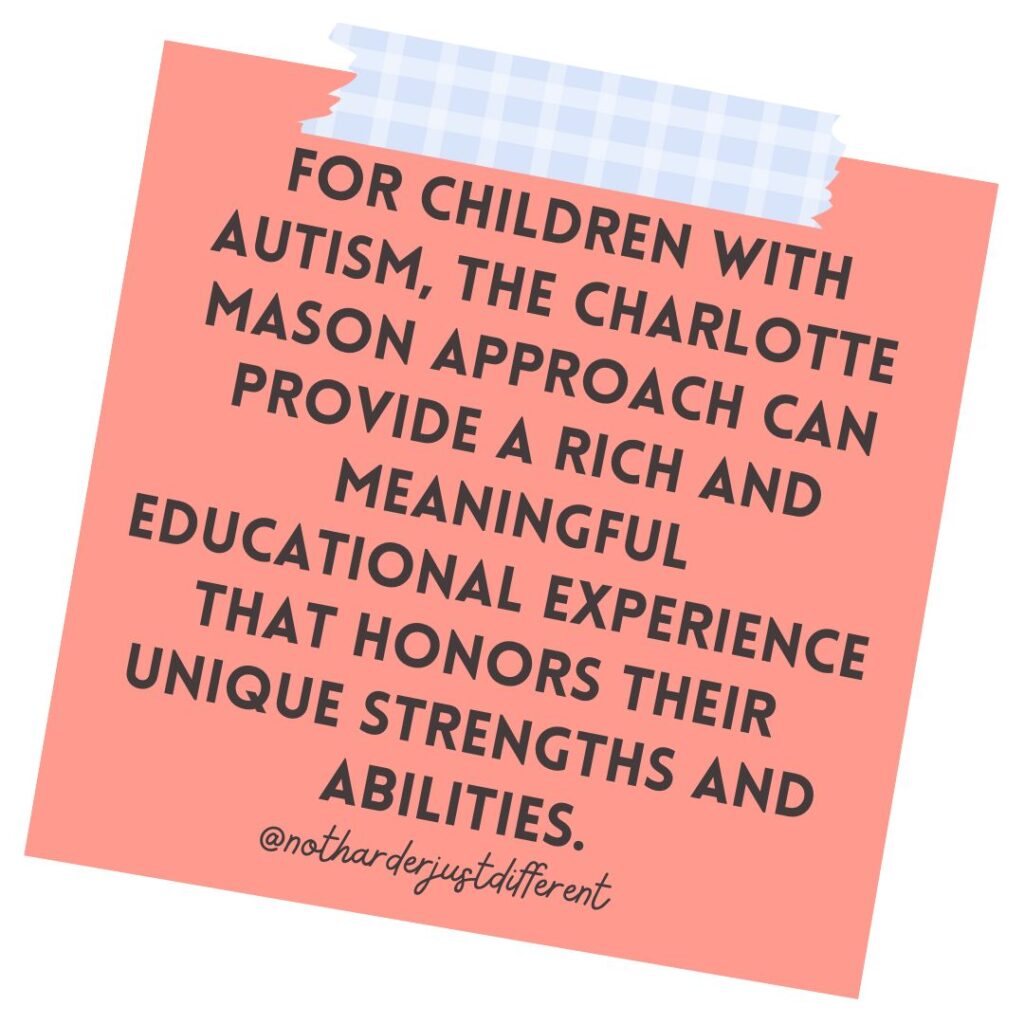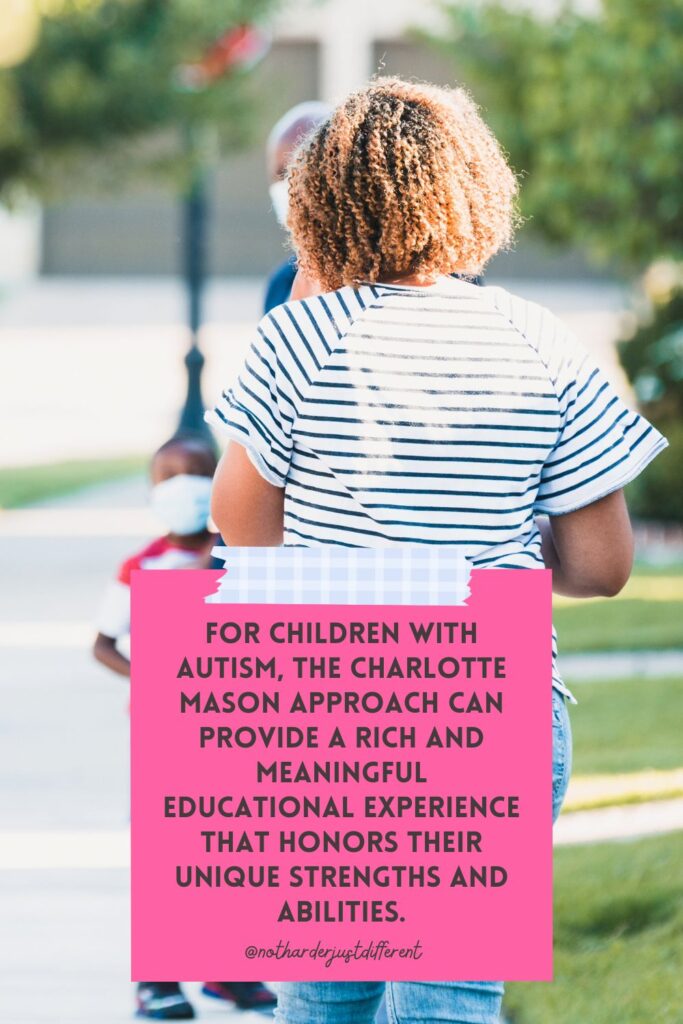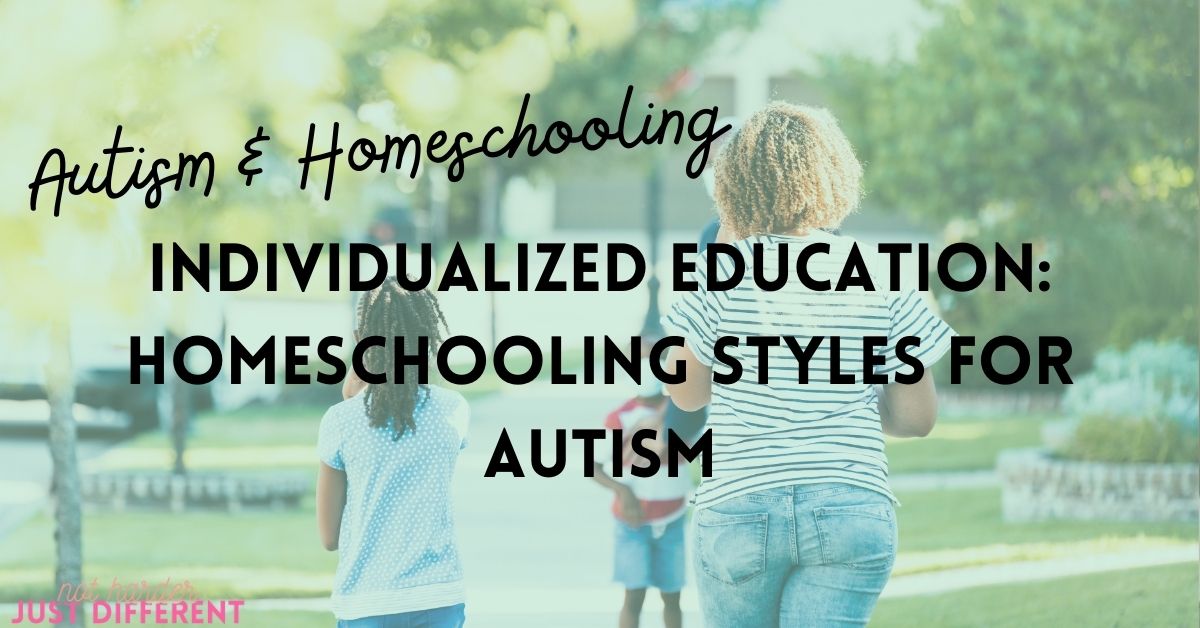Disclaimer: As a future Licensed Clinical Social Worker (LCSW) currently pursuing my master’s degree, I am passionate about sharing insights and information related to parenting, autism and homeschooling based on my personal experiences and research. However, the content shared on this blog is not intended to substitute professional advice, diagnosis, or treatment. Parenting is a deeply personal journey, and while I strive to provide valuable insights, every family and situation is unique. Readers are encouraged to consult with qualified professionals for personalized guidance tailored to their specific needs and circumstances.
Homeschooling opens up a world of possibilities, allowing families to tailor education to their child’s unique needs and preferences. Let’s chat about various homeschooling styles for autism—Montessori, Waldorf, Classical, Charlotte Mason, and more—and explore how each approach can be adapted to support children with autism on their educational journey.
Full disclosure, we’ve bounced around homeschooling styles through the years. I started leaning hard on the school-at-home method, because that’s all I knew. I was traditionally educated, and spent about half of my undergrad thinking I would be a teacher (I think about that now and laugh out loud, literally). 3 days into homeschooling and I knew that was not it for us. We’ve had seasons of unit studies, straight Charlotte Mason, Montessori elements, unschooling… We’ve landed on a very eclectic mix of all of the above. All that to say, takes time to figure it out! Sometimes you have to try something on to know if it will fit or not.
It’s also so important to remember that there’s no one-size-fits-all approach to homeschooling, and what works for one family (even mine!) may not work for another. Rather than feeling pressured to choose a specific homeschooling style or adhere strictly to a particular method, focus on finding what resonates with your family’s values, preferences, and educational goals. Embrace flexibility, creativity, and a willingness to adapt as you go. Remember, the most important factor in homeschooling is the love, support, and dedication you bring to your child’s education each and every day. Trust your instincts, stay true to your family’s unique needs, and have confidence in your ability to create a homeschooling experience that fosters growth, joy, and lifelong learning.
Now, let’s talk homeschool styles!
Individualized Education: Homeschooling Styles for Autism
Montessori Homeschooling
Montessori education emphasizes independence, hands-on learning, and exploration. It encourages children to learn at their own pace and follow their interests within a structured environment that promotes order, concentration, and self-discipline. For children with autism, the Montessori approach can provide a structured yet flexible framework that supports their need for order and predictability. Adaptations may include:
- Structured Workstations: Create organized workstations with clearly defined materials and activities that align with your child’s interests and abilities.
- Sensory-Friendly Materials: Incorporate sensory-rich materials and experiences that engage your child’s senses and promote exploration and discovery.
- Visual Schedules and Timers: Use visual schedules and timers to help your child understand routines, transitions, and time management.
Waldorf Homeschooling
Waldorf education focuses on nurturing the whole child—body, mind, and spirit—through artistic, experiential, and interdisciplinary learning experiences. It emphasizes creativity, imagination, and a connection to nature, fostering a love of learning and a deep appreciation for the world around us. For children with autism, the Waldorf approach can provide a nurturing environment that encourages self-expression and social-emotional development. Adaptations may include:
- Rhythms and Rituals: Establish consistent rhythms and rituals that provide a sense of security and predictability for your child.
- Artistic Expression: Encourage artistic expression through storytelling, music, movement, and creative arts that allow your child to express themselves in non-verbal ways.
- Nature Exploration: Embrace nature-based activities and outdoor experiences that promote sensory exploration and connection with the natural world.
Classical Homeschooling
Classical education is rooted in the pursuit of truth, beauty, and wisdom through the study of classical literature, history, and philosophy. It follows a rigorous and systematic approach to education, with an emphasis on grammar, logic, and rhetoric as the foundational pillars of learning. For children with autism, the Classical approach can provide structure, intellectual stimulation, and opportunities for deep engagement with subjects of interest. Adaptations may include:
- Clear Expectations: Provide clear expectations and guidelines for learning activities, assignments, and assessments to help your child understand what is expected of them.
- Flexible Curriculum: Tailor the classical curriculum to accommodate your child’s interests, strengths, and learning preferences, allowing them to delve deeply into topics that captivate their curiosity.
- Socratic Dialogue: Foster meaningful discussions and critical thinking skills through Socratic dialogue and inquiry-based learning that encourages your child to ask questions, explore ideas, and make connections.

Charlotte Mason Homeschooling
Charlotte Mason education emphasizes living books, nature study, and a gentle approach to learning. It values the formation of good habits, the cultivation of a love of learning, and the development of a child’s moral and intellectual character through meaningful and engaging experiences. For children with autism, the Charlotte Mason approach can provide a rich and meaningful educational experience that honors their unique strengths and abilities. Adaptations may include:
- Living Books and Narration: Select high-quality literature and living books that captivate your child’s imagination and encourage active listening, comprehension, and narration.
- Nature Walks and Observations: Incorporate nature walks, outdoor exploration, and nature journaling activities that promote sensory awareness, observation skills, and appreciation for the natural world.
- Short Lessons and Gentle Routines: Keep lessons short and focused, allowing for frequent breaks and opportunities for movement, sensory regulation, and self-care.
Unit Studies
Unit studies integrate multiple subjects around a central theme or topic of interest, allowing children to explore concepts in depth and make connections across different subject areas. They promote hands-on learning, critical thinking skills, and a holistic understanding of the world. For children with autism, unit studies can provide opportunities for deep engagement, hands-on exploration, and meaningful connections across different subject areas. Adaptations may include:
- Personalized Themes: Tailor unit studies to your child’s interests, strengths, and learning style, allowing them to explore topics that resonate with them on a deep level.
- Visual Supports: Use visual supports such as graphic organizers, mind maps, and concept maps to help your child organize and synthesize information from multiple sources.
- Hands-On Activities: Incorporate hands-on activities, experiments, and projects that allow your child to explore concepts through tactile experiences and sensory exploration.
Unschooling
Unschooling is a learner-led approach to education that emphasizes curiosity, exploration, and self-directed learning. It encourages children to follow their interests, passions, and natural curiosity, allowing learning to happen organically through real-life experiences and meaningful interactions with the world around them. For children with autism, unschooling can provide a natural and flexible learning environment that honors their innate curiosity and individual learning style. Adaptations may include:
- Follow Their Lead: Embrace your child’s interests, passions, and natural curiosity as the driving force behind their learning journey. Allow them the freedom to explore topics and pursue projects that captivate their imagination and fuel their desire to learn.
- Create a Stimulating Environment: Surround your child with a rich and stimulating environment filled with books, art supplies, educational games, and hands-on materials that encourage exploration, creativity, and discovery.
- Encourage Lifelong Learning: Foster a love of learning by modeling curiosity, enthusiasm, and a growth mindset. Encourage your child to ask questions, seek out answers, and engage in meaningful conversations about the world around them.
- Document Learning Experiences: Keep a journal, scrapbook, or digital portfolio to document your child’s learning experiences, interests, and discoveries. Celebrate their accomplishments and growth, and use these reflections as a springboard for further exploration and learning.
Traditional School-at-Home
Traditional school-at-home approaches aim to replicate the structure and curriculum of traditional brick-and-mortar schools within the home environment. They typically follow a structured schedule and curriculum, with a focus on textbooks, worksheets, and assessments. For children with autism, traditional school-at-home can provide a structured and familiar routine that promotes consistency and academic achievement. Adaptations may include:
- Structured Schedule: Establish a structured daily schedule with designated times for lessons, breaks, and other activities to provide a sense of routine and predictability.
- Visual Aids and Supports: Use visual aids such as charts, calendars, and schedules to help your child understand expectations, transitions, and daily routines.
- Individualized Instruction: Provide individualized instruction and support tailored to your child’s unique learning needs, interests, and abilities, allowing them to progress at their own pace.
Online Homeschooling
Online homeschooling programs offer a flexible and customizable approach to education, allowing children to access curriculum, resources, and support from anywhere with an internet connection. They often include interactive learning platforms, multimedia resources, and opportunities for personalized instruction. For children with autism, online homeschooling can provide a personalized learning experience that accommodates their individual needs and preferences. Adaptations may include:
- Interactive Learning Platforms: Select online programs and platforms that offer interactive and engaging learning experiences, including multimedia resources, videos, simulations, and games.
- Flexible Scheduling: Take advantage of the flexibility of online homeschooling to accommodate your child’s preferred learning times, energy levels, and sensory needs.
- Parental Involvement: Maintain regular communication and involvement in your child’s online learning experience, providing guidance, support, and encouragement as they navigate their coursework and assignments.
In conclusion, homeschooling offers a diverse array of styles and approaches that can be tailored to meet the unique needs and preferences of children with autism. By embracing flexibility, creativity, and a deep understanding of your child’s individual strengths and challenges, you can create a homeschooling environment that fosters growth, curiosity, and lifelong learning.


